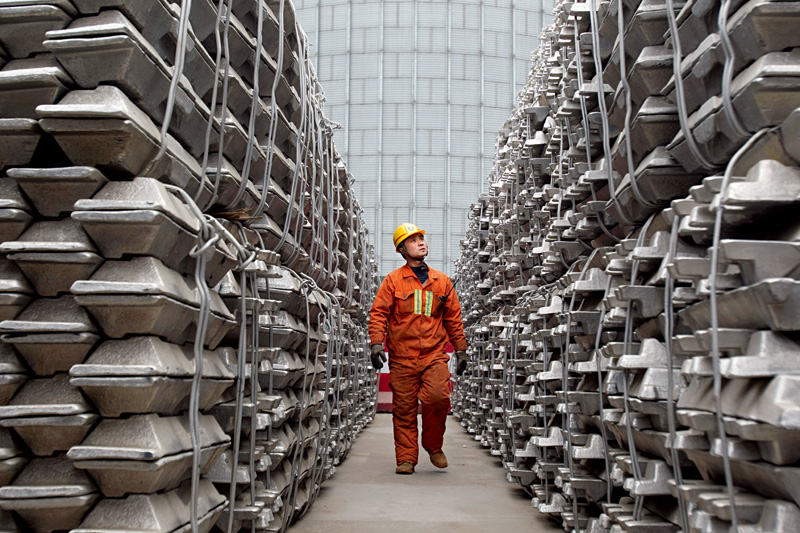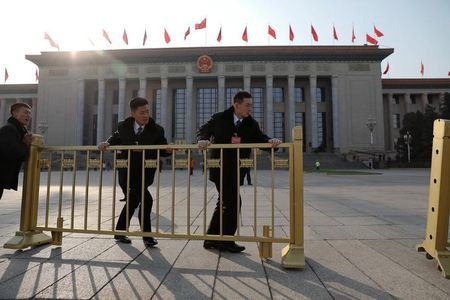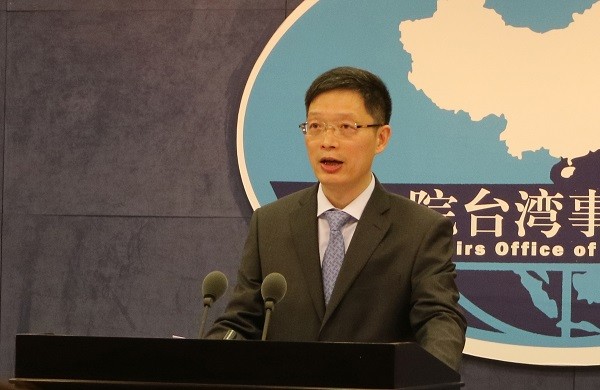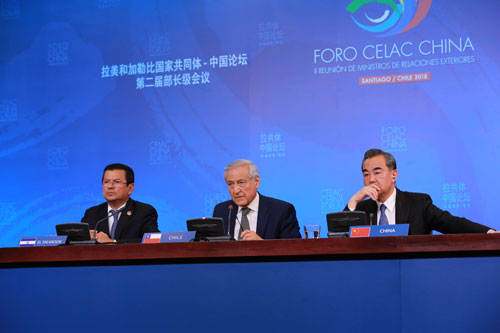
 U.S. Imposes Tariffs on Chinese Aluminum
U.S. Imposes Tariffs on Chinese AluminumFollowing a U.S. Department of Commerce (DOC) investigation into Chinese aluminum imports, the United States imposed anti-dumping and countervailing duties on aluminum foil from China this week. According to the DOC's statement, it concluded that "China sold aluminum foil in the United States at 48.64 to 106.09 percent less than fair value" and provided "unfair subsidies to its producers." The issue will now go before the U.S. International Trade Commission, which will make a final determination regarding the alleged unfair trade. This investigation is separate to the Section 232 steel and aluminum investigations, which President Trump announced his response to this week.
Chinese officials have stated their "strong dissatisfaction" with the new aluminum duties. Chinese trade official Wang Hejun said the U.S. had "ignored the WTO [World Trade Organization] rules and severely impaired the interests of Chinese exporters." Many commentators have questioned whether this marks the beginning of a China-U.S. trade war. China-US Focus contributor Dan Steinbock warned this week that "a tit-for-tat trade war" could have "dark consequences." He argued, "Such moves risk undermining not just international trade but the very institutions— trade-dispute resolution mechanisms— that support it."
The decision to impose duties came during Chinese economic policy official Liu He's visit to the United States, which appeared to be a Chinese government effort to deescalate trade tensions after the Trump administration's recent decision to apply tariffs on solar panels and washing machines and the Chinese government's subsequent decision to investigate U.S. sorghum imports. Despite Liu He's efforts, President Trump is still set to sign new orders next week to impose tariffs on steel and aluminum not just from China, but from the entire global market.
 China's "Two Sessions" Set to Open in Beijing
China's "Two Sessions" Set to Open in BeijingBeginning this Saturday, the National People's Congress, China's top legislature, and the CPPCC National Committee, the country's top political advisory body, will hold their annual sessions. The outcomes of these sessions will be closely followed around the world for indications of China's future political direction and for further detail on policies announced during last October's 19th Party Congress.
The first session of the 13th National People's Congress (NPC), which begins on Monday, is expected to feature the passage of proposed changes to China's constitution, which were made public last Sunday. Importantly, these changes feature the removal of term limits on the posts of president and vice president of the People's Republic of China, from a limit of two terms previously. Should the NPC adopt these changes, they would allow President Xi to remain president beyond 2023. Chinese state media has argued that the move is necessary to ensure stability as China enters a crucial period of development into a modern, socialist country. The move has been met with domestic and international concern. However, President Trump's press secretary, Sarah Sanders, said the decision is one "for China to make about what's best for their country."
The proposed changes also include the formalization of the authority of the National Supervision Commission, a national "political organ" which will aim to fight corruption within state bureaucracy and will have the authority to investigate anyone exercising public authority, including those who are not party members. This is an important part of President Xi's ongoing anti-corruption campaign, which has led to the punishment of almost a million and a half officials. There are also indications that Wang Qishan, a close ally of President Xi in the anti-corruption campaign, may be set to be named China's vice president at the NPC session.
The amendments to the Constitution would also add Xi Jinping Thought on Socialism with Chinese Characteristics for a New Era into the preamble of the country's constitution. Xi Jinping Thought is already enshrined in the Chinese Communist Party constitution.
 China Introduces New Policies to Enhance Taiwan Ties
China Introduces New Policies to Enhance Taiwan TiesAmidst friction with the U.S. over Taiwan policy, this week the Chinese government introduced a range of measures to make it easier for people from Taiwan to work, study, operate businesses and invest in mainland China. According to China Daily, the measures were unveiled by the Taiwan Affairs Office of the State Council and the National Development and Reform Commission as a way of "enhanc[ing] cross-Straits ties." The measures take immediate effect and cover a range of areas, including finance, industry and healthcare. Nineteen measures are devoted to offering Taiwanese living in mainland China equal treatment to mainland residents in education, employment and living. In response to the recent news, Taiwan's Mainland Affairs Council has accused the Chinese government of trying "to win over our public" and change Taiwan's political identity.
The measures come after a tense week between China and the U.S. over both trade policy and recent developments in Taiwan policy. On Wednesday, the U.S. Senate passed the Taiwan Travel Act, which would allow high-level meetings between U.S. and Taiwanese officials. The act only needs President Trump's signature to become law. China-US Focus contributor Zhu Songling argued last year that, "Taiwan is one of China's core interests. . .China will safeguard its sovereignty and territorial integrity at all costs." In response to the passing of the act, Chinese Foreign Ministry spokesperson Hua Chunying said that the "one China" principle is the foundation for China-U.S. ties. Chinese officials have said numerous times that Taiwan is the most sensitive issue in China's relations with the United States.
 This Week's Top Commentary
This Week's Top CommentaryMargaret Myers, an expert on China's presence in Latin America and the Director of the Latin American and World Program at the Inter-American Dialogue, analyzes China's recent engagement in Latin America and argues that perhaps China understands Latin America better than the U.S. does.
"At the beginning of February, Secretary of State Rex Tillerson voiced his—and presumably the broader Trump administration's—concerns about China's rise in Latin America. Secretary Tillerson warned Latin America about its ties to the Asian nation, stating that "China's offers always come at a price," and describing Beijing's ambitions as imperialistic. . .
Behind all of this, and countless hearings and panels on China's rise in the region, is a broader sense that the U.S. risks losing influence, competitiveness, and control in Latin America."
Read the full article on China-US Focus.
Prepared by China-US Focus editorial teams in Hong Kong and New York, this weekly newsletter offers you snap shots of latest trends and developments emerging from China every week, while adding a dose of historical perspective.
- 2018-02-23 A Week of Developments Related to North Korea
- 2018-02-16 Cui Tiankai says U.S. Should Not Advocate Confrontational Strategy Towards China
- 2018-02-09 China Releases the “No.1 Central Document” Containing New Rural Policies
- 2018-02-02 Wang Qishan Appointed to the National Legislature
- 2018-01-26 New Edition of the Focus Digest
- 2018-01-19 South Korea and North Korea to Compete Together at the Winter Olympics
- 2018-01-12 U.S. House of Representatives Passes Taiwan Bills
- 2018-01-05 U.S. Rejects Sale of Moneygram to China’s Ant Financial
- 2017-12-22 Trump’s National Security Strategy Labels China a “Revisionist Power”
- 2017-12-15 White House and Secretary of State contradict each other on North Korea talks
- 2017-12-08 China Boasts its Technology Chops at the 4th Annual World Internet Conference
- 2017-12-01 The Future of the China-US Economic Relationship
- 2017-11-17 The “Indo Pacific”: A New American Strategy for Asia?
- 2017-11-10 President Trump Revels in China’s State-Visit Red Carpet Treatment
- 2017-11-03 Will China Display Hard or Soft Power in the Era of Xi?
- 2017-10-27 All Eyes on Xi
- 2017-10-20 The 19th Party Congress Begins
- 2017-10-13 Tech Titans
- 2017-10-06 China’s Super Golden Week
